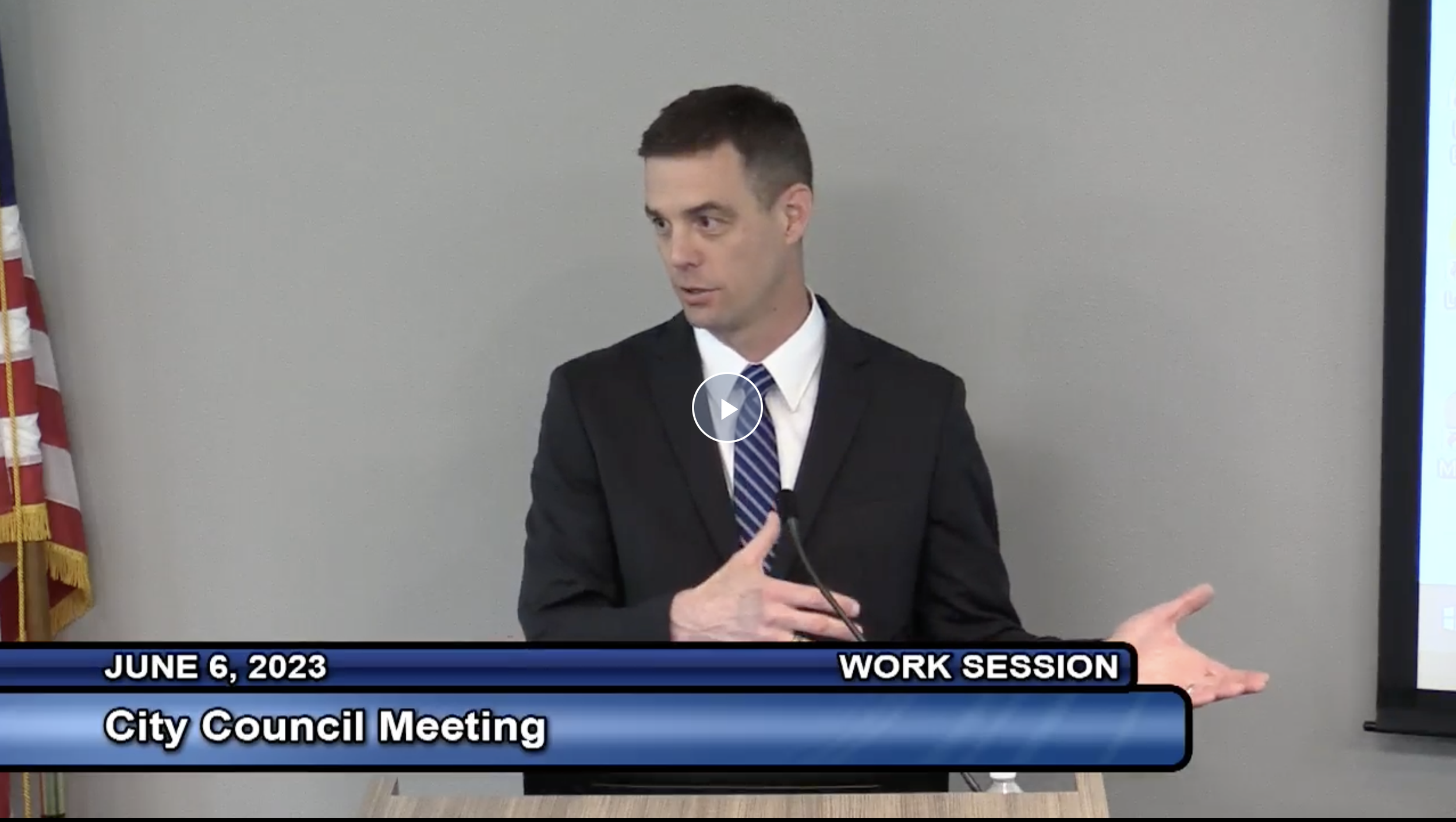DCTA Has Exceeded Pre-Pandemic Ridership, Says CEO
June 14, 2023
Paul Cristina, CEO of the Denton County Transportation Authority (DCTA) briefed the Denton City Council on June 6 regarding current and future DCTA activities and initiatives.
Mr. Cristina shared that DCTA has exceeded pre-pandemic ridership across the system, noting that most transit agencies in the United States are still below their pre-pandemic ridership numbers.
Compared to this time last year, ridership has increased 68 percent on GoZone, 43 percent on Connect bus routes, 40 percent on UNT bus routes and 27 percent on the A-Train.
“Our customers respond to frequency,” said Mr. Cristina. In July 2022, the DCTA Board voted to increase the frequency on Denton Connect bus routes 3, 6 and 7. Route 7 saw a 101 percent increase in ridership between April 2022 and April 2023 after its frequency was increased from every 33 minutes to every 20 minutes.
Mr. Cristina also shared performance metrics for GoZone and bus service. The percentage of GoZone ride requests that are rejected due to lack of available seats has declined to an average of six percent in Denton. Seat unavailability hit a record high 21 percent of all ride requests in September 2022.
Higher GoZone fares and more frequent Connect bus service went into effect in January 2023.
Wait times for GoZone have stabilized to an average of 17-20 minutes in Denton, which is within the DCTA Board’s wait time goal of 24 minutes or less.
Via, the technology company behind GoZone, projected wait times of 15 minutes or less in their original proposal to DCTA. Except for its first two months of operation, GoZone has never achieved monthly average wait times below 17 minutes.
Approximate GoZone wait times and ridership by month from September 2021 through April 2023.
Actual wait times for GoZone can be as little as 3-5 minutes or more than an hour depending on GoZone capacity when a potential rider requests a ride. Potential riders receive a “no available seats” error message if their wait time is projected to be longer than 30 minutes. In these cases, the GoZone app rejects the ride request, and the potential rider must repeatedly request a ride until a seat becomes available.
“Why do we think 24 minutes is a good benchmark for wait time for GoZone?” Denton City Council member Paul Meltzer asked Mr. Cristina. “Intuitively, sounds like a long time.”
Mr. Cristina responded that, from the beginning, the standard was that wait times above 30 minutes would not be allowed. “As the service evolved,” Mr. Cristina continued, “we coordinated with Via and said what is reasonable based on the ridership demand and what the algorithm and the vehicles on the street can deliver? And so that’s where we get the 24-minute mark.”
Mr. Cristina shared that about eight percent of all GoZone trips start and end within a quarter mile of an existing bus stop for Route 3, 6, or 7. As part of a multi-phase plan, DCTA hopes to explore the possibility of directing GoZone users to a nearby bus route for trips that begin and end within a quarter mile of an existing bus stop.
In the second phase, at an unknown date, DCTA hopes to explore the possibility of eliminating the ability to book a GoZone for trips that begin or end within a quarter mile of an existing bus stop for Route 3, 6, or 7.
In the third phase, at an unknown date, DCTA hopes to explore the possibility of adding two more existing bus routes, UNT’s Colorado Express and Discovery Park routes, to the geofenced area where a GoZone cannot be booked for trips that begin or end within a quarter mile of a bus stop.
Denton City Council member Chris Watts expressed concern over preventing riders from booking a GoZone if they are within a quarter mile of a bus stop. “A quarter mile is a long way to walk,” said Watts.
“Maximizing resources to serve the largest number of people, it points exactly to this place,” responded Mr. Cristina. “If the bus is full, it’s a very cost-effective mode. When the bus is not full, GoZone can be more cost-effective.”
Mr. Cristina noted that most transit agencies integrate microtransit like GoZone as a last-mile service at the end of existing bus routes rather than operating them as separate services. “I haven’t found another agency doing what DCTA is doing,” Mr. Cristina said. “We’re not afraid to lead, but we don’t want to bleed our customers. This phased approach is the way that we address that. Let’s see how people respond when they’re not able to get a GoZone ride within those three routes.”
A goal of the three-phased approach, according to Mr. Cristina’s, is to maximize ridership and optimize use of a potential five-route core bus network. This approach can then free up GoZone capacity that the DCTA Board can redistribute to areas of the city that do not have any DCTA service.
Denton’s representative on the DCTA Board, Alison Maguire, noted that she lives in an area of Denton that does not have bus or GoZone service. “Now that I see more stability coming down the line at DCTA,” said Maguire, “I feel more comfortable now asking for things like every part of the city that pays sales tax should also receive some level of service.”
According to DCTA’s most recent budget, $39.6 million of DCTA’s $70.7 million in revenue comes from sales tax receipts. DCTA’s member cities Denton, Lewisville and Highland Village allocate a voter-approved half-cent sales tax to fund DCTA.
Safety and Training
Mr. Cristina shared recent incident data for both GoZone and fixed route buses.
Between October 2022 and April 2023, GoZone had six FTA incidents and 31 non-FTA incidents while fixed route buses had one FTA incident and 28 non-FTA incidents.
FTA incidents are injuries or damage exceeding $11,500 that must be reported to the Federal Transit Administration. For employees, an injury is reportable if they miss work time or are prescribed medication due to the injury.
The A-Train had one reportable incident October through April due to an employee inuring their ankle in the parking lot.
GoZone drivers undergo onboarding training prior to operating a GoZone vehicle. Onboarding includes an overview of the service, the app, and driver expectations. Drivers are also required to complete one e-learning module about safety tips and tools.
The remaining five e-learning modules are optional for drivers, though they receive in-app nudges to complete them:
Via driver app how-to;
Via policies;
Disability awareness and sensitivity;
Customer service tips;
Avoiding and defusing conflicts with riders.
Mr. Cristina noted that DCTA has had extensive discussions with Via regarding the possibility of making more training modules mandatory for drivers, including budget impacts and anticipated outcomes of additional training. Based on these discussions, DCTA has not taken steps to make more training modules mandatory.
Current and Future Projects
Mr. Cristina briefly shared additional projects and initiatives that are currently in the pipeline for DCTA:
Looking to enhance the customer service experience by consolidating customer service into a single in-house location rather than two separate customer service locations for GoZone and fixed route buses.
Working towards the construction of a joint rail operating facility with Dallas Area Rapid Transit (DART). The facility would be located in Carrollton near DART’s Silver Line.
Exploring the possibility of adding an A-Train station in Corinth and in Carrollton. The Carrollton station would connect to DART’s Silver Line, which will connect riders to DFW Airport.
Assessing the impacts of potentially offering fare-free service.
Developing an inventory of all bus stop infrastructure. In late 2022, the North Central Texas Council of Governments (NCTCOG) awarded $1 million to DCTA to improve bus stops. Once the inventory is complete, DCTA plans to relocate unused bus stop infrastructure and also build new bus stops.
Collaborating with member cities to maximize A-Train ridership by prioritizing transit-oriented development along key transit corridors. Enhancing these corridors with better walkability, bikeability and bus stops can support higher ridership on both the A-Train and fixed route buses.
Video Recording of Meeting
Access recording of full presentation and discussion from June 6, 2023.


